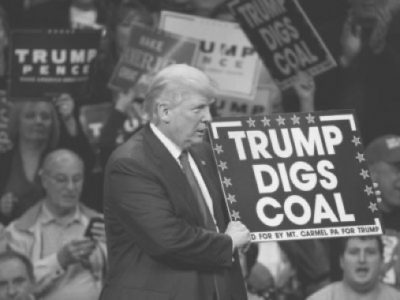Clean Air Act
A Very Bad House Vehicle Pollution Bill
The Fuel Emissions Freedom Act may be a stunt, but it’s worth examining
It can be hard to keep track amid all the hair-raising developments in Congress and at the Supreme Court, but last week, a group of House Republicans led by Roger Williams of Texas introduced the Fuel Emissions Freedom Act, hot on the heels of the purported (illegal) termination of California’s vehicle emissions standard waiver. This freedom-to-pollute …
Continue reading “A Very Bad House Vehicle Pollution Bill”
CONTINUE READINGThe Emperor’s New Endangerment Theory (Wrap-Up)
Trump’s EPA says carbon emissions from U.S. power plants are too insignificant to regulate.
U.S. power plants emit 1.5 billion tons of carbon dioxide a year, a little less than the entire country of Russia. The Trump Administration is proposing to end all regulation of carbon emissions by power plants, on the theory that these emissions should be considered insignificant. They have some complicated legal arguments , but the arguments break down the more closely you look at them.
CONTINUE READINGThe Emperor’s New Endangerment Theory (Part II)
To justify a decision not to regulate CO2 from power plants, EPA had to twist statutory language beyond all recognition.
According to EPA, carbon emissions from the U.S. power sector are too insignificant to warrant regulation. This is a bizarre conclusion: U.S. power sector’s emissions are around 6.5 billion tons, just below Russia’s total emissions from all sectors. To reach this conclusion, EPA has proposed a novel reading of the Clean Air Act. In EPA’s view, before it could regulate those emissions, it would first have to make a formal finding that they “cause or significantly contribute” to climate change, and (2) that this has to be judged on the basis of the sector’s percentage of total global carbon emissions. The statute doesn’t say either of those things.
CONTINUE READINGThe Chutzpah is Stunning
The Trump Administration is suing to block state climate lawsuits based on Clean Air Act Preemption.
If nothing else, you have to give credit to the Trump Administration for incredible gall. Yesterday, the Department of Justice filed suit against Michigan and Hawaii seeking to stop those states from filing lawsuits against fossil fuel companies for climate damages. The fact that DOJ is seeking to prevent even the filing of the lawsuits …
Continue reading “The Chutzpah is Stunning”
CONTINUE READINGDoes Deregulation Hypercharge the Economy?
If the economics effects are that huge, you’d expect the unemployment rate reflect major regulatory or deregulatory moves. It doesn’t.
EPA’s head sats that “EPA will be reconsidering many suffocating rules that restrict nearly every sector of our economy and cost Americans trillions of dollars.” If regulation and deregulation are that big a deal economically, we should clearly see their imprint on unemployment. It turns out that even the biggest regulatory and most dramatic deregulatory actions have no discernible effect on the job market.
CONTINUE READINGTrump’s Discordant Coal Quartet
Yesterday’s four executive orders were long on talk and short on action.
Yesterday, flanked by a coal miners in hard hats, Trump signed four executive orders to restore their industry to its past glory. Given that coal is now the most expensive way to generate power other than nuclear, that’s going to be a heavy lift. Like many of Trump’s orders, these four are full of threats and bluster, but will have little immediate effect. These orders give the same impression as many executive orders — that Something Important is Being Done — but they are really more in the way of promises of future action.
CONTINUE READINGThe CRA and the filibuster
Expanding the scope of the CRA might also result in weakening the filibuster
This is the third in a series of blog posts examining the possible application of the Congressional Review Act (CRA) to California’s waivers under the Clean Air Act allowing the state to issue its own emissions standards for motor vehicles. The first post is here. The second post is here. Another possible implication of applying …
Continue reading “The CRA and the filibuster”
CONTINUE READINGThe CRA and permits
Applying the CRA to the California waivers might open the door to Congressional review of permits more broadly
This is the second in a series of blog posts examining the possible application of the Congressional Review Act (CRA) to California’s waivers under the Clean Air Act allowing the state to issue its own emissions standards for motor vehicles. The first post is here. The basic legal question at the heart of the dispute …
Continue reading “The CRA and permits”
CONTINUE READINGWhat is the scope of the Congressional Review Act?
Possible implications of expanding the CRA to the California waivers, and beyond
The Congressional Review Act (CRA) provides a tool for majorities in the House and Senate, along with the President, to overturn a recently promulgated agency regulation, and to legislatively prohibit promulgation of a “substantially the same” regulation in the future. By its nature – since it requires Presidential approval of the relevant joint Congressional resolution …
Continue reading “What is the scope of the Congressional Review Act?”
CONTINUE READINGDissecting the Attacks on the Endangerment Finding
EPA has identified four different arguments against the endangerment finding. None have merit.
In late 2009, EPA made a formal finding — often called the Endangerment Finding —that greenhouse gases may endanger human health and welfare. Undaunted by the overwhelming scientific evidence in favor of that finding, the Trump EPA plans to reconsider that finding. Few independent observers believe EPA will succeed, but the issue is important enough to warrant a close look. Here’s a deep dive.
CONTINUE READING








